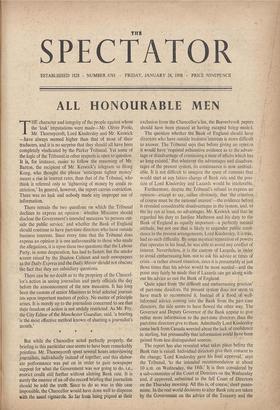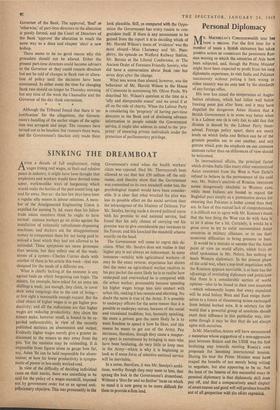ALL HONOURABLE MEN
THE character and integrity of the people against whom the 'leak' imputations were made—Mr. Oliver Poole, Mr. Thorneycroft, Lord Kindersley and Mr. Keswick —have always seemed higher than that of most of their traducers, and it is no surprise that they should all have been completely vindicated by the Parker Tribunal. Yet some of the logic of the Tribunal in other respects is open to question. It is, for instance, easier to follow the reasoning of Mr. Barton, the recipient of Mr. Keswick's telegram to •Hong Kong, who thought the phrase 'anticipate tighter money' meant a rise in interest rates, than that of the Tribunal, who think it referred only to 'tightening of money by credit re- striction.' In general, however, the report carries conviction. There was no leak and nobody made any improper use of information.
There remain the two questions on which the Tribunal declines to express an opinion : whether Ministers should disclose the Government's intended measures 'to persons out- side the public service,' and whether the Bank of England should continue to have part-time directors who have outside business interests. Since every time that the Tribunal does express an opinion it is one unfavourable to those who made the allegations, it is upon these two questions that the Labour. Party, in some desperation, has had to fasten; but the smoke screen raised by the Shadow Cabinet and such newspapers as the Daily Express and the Daily Mirror should not obscure the fact that they are subsidiary questions.
There can be no doubt as to the propriety of the Chancel- lor's action in seeing journalists and party officials the day before the announcement of the new measures. It has long been the custom of senior Ministers to brief selected journal- ists upon important matters of policy. No matter of principle arises. It is merely up to the journalists concerned to see that their freedom of action is not unduly restricted. As Mr. Fry, the City Editor of the Manchester Guardian, said, 'a briefing is the most effective method known of shutting a journalist's mouth.'
But while the Chancellor acted perfectly properly, the briefing in this particular case seems to have been remarkably pointless. Mr. Thorneycroft spent several hours interviewing journalists, individually instead of together; and this elabor- ate performance was put on in order to gain newspaper support for what the Government was not going to do, i.e., restrict credit still further without altering Bank rate. It is surely the essence of an off-the-record briefing that journalists should be told the truth. Since to do so was in this case impossible, the Chancellor would have done well to dispense with the usual rigmarole. So far from being piqued at their' exclusion from the Chancellor's list, the Beaverbrook papers should have been pleased at having escaped being misled.
The question whether the Bank of England should havp directors who have outside business interests is more difficult to answer. The Tribunal says that before giving an opinion it would have 'required exhaustive evidence as to the advan- tage or disadvantage of continuing a state of affairs which has so long existed.' But whatever the advantages and disadvan- tages of the present system, its continuance is now unthink- able. It is not difficult to imagine the spate of rumours that would start at any future change of Bank rate and the posi- tion of Lord Kindersley and Lazards would be intolerable.
Furthermore, despite the Tribunal's refusal to express an opinion—except to say, rather obviously, that 'the criterion of course must be the national interest'—the evidence before it revealed considerable disadvantages in the system, and, to the lay eye at least, no advantages. Mr. Keswick said that he regarded his duty to Jardine Matheson and his duty to the Bank of England as equally important—a perfectly natural attitude, but not one that is likely to engender public confi- dence in the present arrangements. Lord Kindersley, it is true, had no such difficulty. By some mystical separation of powers that operates in his head, he was able to avoid any conflict of interest. Nevertheless, it is the custom of Lazards, in order to avoid embarrassing him, not to ask his advice at times of crisis—a rather absurd situation, since it is presumably at just those times that his advice would be most needed—and the point may fairly be made that if Lazards can get along with- out his advice so can the Bank of England.
Quite apart from 'the difficult and embarrassing position' of part-time directors. the present system does not seem to have much to recommend it. Instead of a flood of well- informed advice coming into the Bank from the part time directors, the tide seems to have flowed the other way. The ' Governor and Deputy Governor of the Bank appear to give rather more information to the part-time directors than the part-time directors give to them. Admittedly Lord Kindersley came back from Canada worried about the lack of confidence in sterling, but presumably that information' could have been gained from less distinguished sources.
The report has also revealed what takes place before the Bank rate is raised. Individual directors give their consent to the change; 'Lord Kindersley gave his final approval,' says the Tribunal, 'to the intended recommendation at about 10 a.m. on Wednesday, the 18th.' It is then considered by a sub-committee of the Court of Directors on the Wednesday and, if approved, submitted to the full Court of Directors on the Thursday morning. All this is, of course, sheet panto- mime. In the real world decisions to alter Bank rate are taken by the Government on the advice of the Treasury and the
Governor of the Bank. The approval, `final' or 'otherwise,' of part-time directors to the alteration is purely formal, and the Court of Directors of the Bank 'approve' the alteration in much the same way as a dean and chapter `elect' a new bishop.
There seems to be no good reason why this procedure should not be altered. Either the present part-time directors could become advisers to the Governor or they could remain directors but not be told of changes in Bank rate or altera- tion of policy until the decisions have been announced. In either event the time for changing Bank rate should no longer be Thursday morning but any time of the week the Chancellor and the Governor of the day think convenient.
Although the Tribunal found that there is 'no justification' for the allegations, the Govern- ment's handling of the earlier stages of the agita- tion was arrogant and inept. The rumours have turned out to be baseless, but rumours there were, and the Government's inaction only made them look plausible. Still, as compared with the Oppo- sition the Government has every reason to con- gratulate itself. If there is any amusement to be gained from the report it is in deciding which of Mr. Harold Wilson's items of `evidence' was the most absurd—Miss Chataway and Mr. Pum- phrey, the episode on Watford Railway Station, Mr. Bareau at the Liberal Conference, or The Ancient Order of Foresters Friendly Society, who did have a conversation about Bank rate but seven days after the change.
What was worse than absurd, however, was the behaviour of Mr. Harold Wilson in the House of Commons in mentioning Mr. Oliver Poole. We described Mr. Wilson's question at the time as a `silly and disreputable smear' and we erred if at all on the side of charity. When the Labour Party is considering the 'propriety' of having part-time directors at the Bank and of disclosing advance information to people outside the Government service, it might also address its mind to the 'pro- priety' of smearing private individuals under the protection of parliamentary privilege.



































 Previous page
Previous page